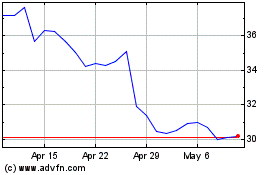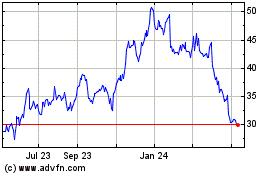By Dana Mattioli and Dana Cimilluca
This article is being republished as part of our daily
reproduction of WSJ.com articles that also appeared in the U.S.
print edition of The Wall Street Journal (March 10, 2018).
Intel Corp. is considering a range of acquisition alternatives
in reaction to Broadcom Ltd.'s hostile pursuit for Qualcomm Inc.
that could include a bid for Broadcom, according to people familiar
with the matter.
Intel is watching the takeover battle closely and is eager for
Broadcom to fail as the combined company would pose a serious
competitive threat, the people said. If it becomes apparent that
Broadcom is likely to prevail, Intel could step in with its own
offer for Broadcom, the people said.
Intel has been considering such a move since late last year and
is working with advisers, some of the people said. It is far from
guaranteed that Intel would ultimately make such a move -- one of
the people said it is unlikely -- and the complexity and size of
such a combination would be enormous. Broadcom currently has a
market value of about $104 billion.
It is also possible that Intel ultimately decides to make other,
smaller acquisitions, one of the people said.
The news of Intel's review adds a new twist to a takeover drama
that has been unfolding since late last year. Broadcom has waged a
monthslong hostile fight to take over Qualcomm, which would reshape
the semiconductor industry and have major ramifications for
competitors such as Intel.
It also shows the extent to which a Broadcom-Qualcomm tie-up
would upend the semiconductor industry.
Intel and Qualcomm are fierce rivals and Intel has been working
to chip away at Qualcomm's strong position in making equipment for
wireless devices, namely those from Apple Inc. Qualcomm and Apple
have been in a bitter licensing dispute and Apple lately has
switched to Intel chips in a portion of its devices. Should
Broadcom succeed in buying Qualcomm, it could smooth over relations
with Apple, closing a door to further possible gains from
Intel.
A Broadcom deal would be Intel's biggest acquisition by far --
and should it pursue one, there is no guarantee regulators would
bless it. Intel, based in Santa Clara, Calif., and with a market
value of nearly $240 billion, has been acquisitive in recent years
as it looks to diversify away from its core business of powering
the personal-computer industry, which is in decline.
Last year, Intel bought Israeli car-camera pioneer Mobileye NV
for roughly $15.3 billion in a bet on connected cars. In 2015, it
struck its largest deal ever when it bought Altera Corp. for $16.7
billion. Intel hoped that buying Altera, a maker of programmable
chips, would help bolster its position in server systems and other
equipment found in data centers and telecommunications networks,
the company said at the time, as well as fuel its plans surrounding
the so-called Internet of Things.
In the most recent piece of drama surrounding Broadcom's bid to
buy Qualcomm, the effort was dealt a setback when the Committee on
Foreign Investment in the U.S., or CFIUS, indicated it has concerns
about the takeover and would review it.
That appeared to lengthen the odds that Broadcom and its chief
executive, Hock Tan, would succeed in their pursuit of Qualcomm,
which has rejected the $117 billion offer as too low.
Separately, Qualcomm has in place its own pending $44 billion
deal to buy NXP Semiconductors NV, which it sweetened in February,
a move Broadcom criticized.
Qualcomm and Broadcom unleashed dueling announcements Friday as
each sought to win support from regulators and shareholders during
the takeover fight.
Qualcomm, looking to assert its board's independence, said Paul
Jacobs would no longer be executive chairman. Mr. Jacobs, the son
of Qualcomm co-founder Irwin Jacobs, will remain on the board.
Current board member Jeffrey Henderson was named nonexecutive
chairman.
Broadcom has been seeking to replace a majority of Qualcomm's
board members to help pave the way for a deal. A vote on the
directors that was slated to take place this past Tuesday at
Qualcomm's annual meeting was pushed back a month at CFIUS's
behest.
Broadcom, meanwhile, pledged that if it succeeds in acquiring
its target, it wouldn't sell "any critical national security assets
to any foreign companies." The assurance was a nod to U.S. concerns
that a takeover could weaken Qualcomm's position -- and therefore
the country's standing -- as a leader in developing next-generation
5G cellular technology.
Broadcom late Friday said it will ask shareholders to vote March
23 to approve the company's plan to redomicile from Singapore to
the U.S., potentially setting the stage for a showdown with CFIUS
as the vote would take place in the middle of the panel's review of
Broadcom's bid.
If Broadcom were considered a U.S. company, its acquisition
would arguably fall outside of the panel's jurisdiction, though
CFIUS could say it still has jurisdiction to review the bid since
it began the review while Broadcom was a Singapore company.
Should Broadcom fail in its bid for Qualcomm, it is possible
Intel would stand down, happy with the status quo.
Underlying the maneuvering is a battle among chip companies to
be the chief supplier of critical cellular components to smartphone
makers such as Apple and Samsung Electronics Co.
Qualcomm is a leader in chips that run apps and manage cellular
communications in smartphones. It competes with Broadcom in chips
for short-range wireless networking, including Bluetooth and Wi-Fi,
and radio filters and other chips that condition cellular
signals.
Intel, which dominates the market for the calculating engines in
personal computers and data-center servers, missed the mobile
revolution when its chips proved too power-hungry for
battery-dependent cellphones. But Intel's cellular communications
chips lately have displaced Qualcomm's in a portion of Apple's
iPhones, and the company has been moving aggressively to develop
that product line.
Acquiring Broadcom would give Intel a suite of smartphone chips,
adding to its own communications chips the Singapore-based
company's radio filters as well as Bluetooth and GPS
components.
Broadcom sells a diverse line of equipment for networking and
communications -- including technology for smartphones from Apple
and Samsung -- as well as data storage, electronic displays and
set-top boxes. Broadcom, like Qualcomm, is a so-called fabless chip
company, designing processors while relying on manufacturers such
as Taiwan Semiconductor Manufacturing Co. to actually make
them.
Under Mr. Tan, Broadcom has pursued a string of acquisitions.
The company was formed when Avago Technologies Ltd. in 2015 agreed
to buy the former Broadcom for roughly $37 billion and kept its
name. Broadcom's revenue was twice the size of Avago's at the time
of the merger.
Write to Dana Mattioli at dana.mattioli@wsj.com and Dana
Cimilluca at dana.cimilluca@wsj.com
(END) Dow Jones Newswires
March 10, 2018 02:47 ET (07:47 GMT)
Copyright (c) 2018 Dow Jones & Company, Inc.
Intel (NASDAQ:INTC)
Historical Stock Chart
From Mar 2024 to Apr 2024

Intel (NASDAQ:INTC)
Historical Stock Chart
From Apr 2023 to Apr 2024
